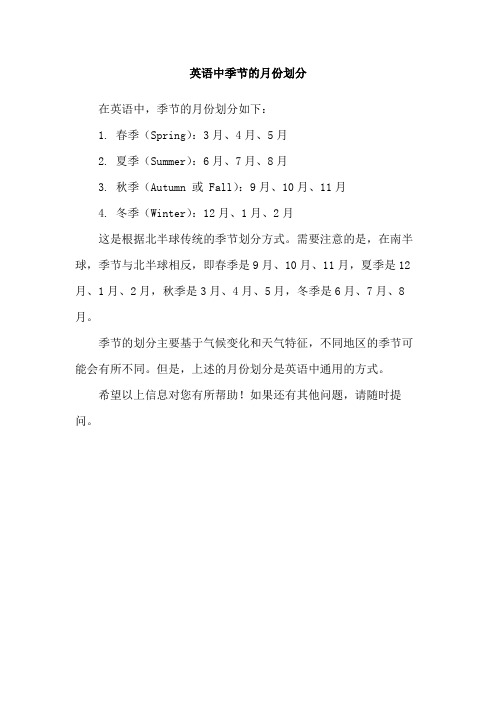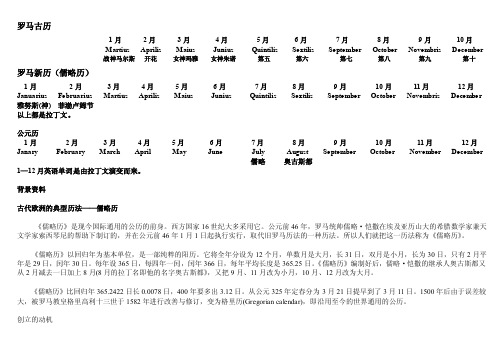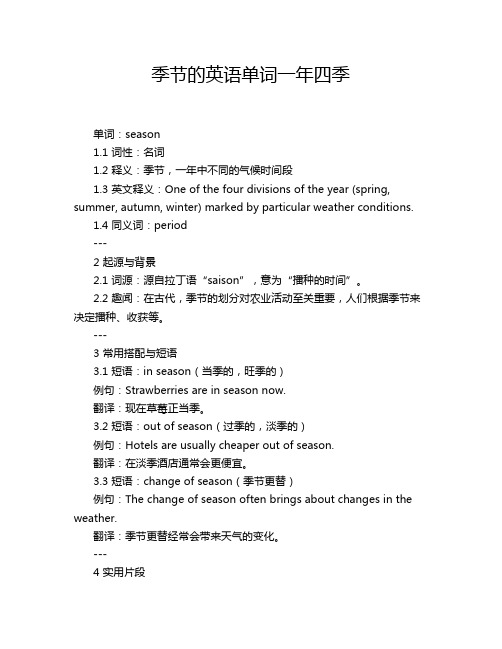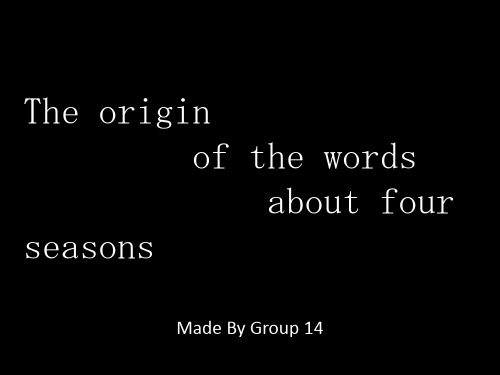四季的英文单词的起源与发展
英语中季节的月份划分

英语中季节的月份划分
在英语中,季节的月份划分如下:
1. 春季(Spring):3月、4月、5月
2. 夏季(Summer):6月、7月、8月
3. 秋季(Autumn 或 Fall):9月、10月、11月
4. 冬季(Winter):12月、1月、2月
这是根据北半球传统的季节划分方式。
需要注意的是,在南半球,季节与北半球相反,即春季是9月、10月、11月,夏季是12月、1月、2月,秋季是3月、4月、5月,冬季是6月、7月、8月。
季节的划分主要基于气候变化和天气特征,不同地区的季节可能会有所不同。
但是,上述的月份划分是英语中通用的方式。
希望以上信息对您有所帮助!如果还有其他问题,请随时提问。
春夏秋冬英语单词形象记忆法

春夏秋冬英语单词形象记忆法
春夏秋冬是四季的名称,每个季节都有独特的气息、景象和活动。
如果你正在学习英语,这些季节的单词也是必须记忆的。
下面为大家介绍四个英语单词形象记忆法,帮助你更轻松地记忆这些单词。
1、Spring(春天)
Spring是春天的意思,可以把它理解为“弹簧”的意思,因为春天的气温逐渐升高,万物开始复苏生长,像弹簧一样跃跃欲试。
2、Summer(夏天)
Summer是夏天的意思,可以把它理解为“有太阳”的意思,因为夏天是阳光最强烈的季节,大家会在太阳下享受各种户外活动,如游泳、野餐等。
3、Autumn(秋天)
Autumn是秋天的意思,可以把它理解为“落叶”的意思,因为秋天树叶逐渐变黄,落下来,地面上铺满了枯叶,是一幅美丽的景象。
4、Winter(冬天)
Winter是冬天的意思,可以把它理解为“下雪”的意思,因为在北半球的冬天,天气寒冷,雪花纷飞,一片银装素裹的景象非常美丽。
以上就是四个英语单词形象记忆法,希望可以帮助大家更轻松地记忆这些单词,学好英语。
- 1 -。
1—12月英语单词的演变及罗马历法

罗马古历1月2月3月4月5月6月7月8月9月10月Martius Aprilis Maius Junius Quintilis Sextilis September October Novembris December战神马尔斯开花女神玛雅女神朱诺第五第六第七第八第九第十罗马新历(儒略历)1月2月3月4月5月6月7月8月9月10月11月12月Januarius Februarius Martius Aprilis Maius Junius Quintilis Sextilis September October Novembris December 雅努斯(神) 菲渤卢姆节以上都是拉丁文。
公元历1月2月3月4月5月6月7月8月9月10月11月12月Janary February March April May June July August September October November December儒略奥古斯都1—12月英语单词是由拉丁文演变而来。
背景资料古代欧洲的典型历法——儒略历《儒略历》是现今国际通用的公历的前身。
西方国家16世纪大多采用它。
公元前46年,罗马统帅儒略·恺撒在埃及亚历山大的希腊数学家兼天文学家索西琴尼的帮助下制订的,并在公元前46年1月1日起执行实行,取代旧罗马历法的一种历法。
所以人们就把这一历法称为《儒略历》。
《儒略历》以回归年为基本单位,是一部纯粹的阳历。
它将全年分设为12个月,单数月是大月,长31日,双月是小月,长为30日,只有2月平年是29日,闰年30日。
每年设365日,每四年一闰,闰年366日,每年平均长度是365.25日。
《儒略历》编制好后,儒略·恺撒的继承人奥古斯都又从2月减去一日加上8月(8月的拉丁名即他的名字奥古斯都》,又把9月、11月改为小月,10月、12月改为大月。
《儒略历》比回归年365.2422日长0.0078日,400年要多出3.12日。
季节的英语单词一年四季

季节的英语单词一年四季单词:season1.1 词性:名词1.2 释义:季节,一年中不同的气候时间段1.3 英文释义:One of the four divisions of the year (spring, summer, autumn, winter) marked by particular weather conditions.1.4 同义词:period---2 起源与背景2.1 词源:源自拉丁语“saison”,意为“播种的时间”。
2.2 趣闻:在古代,季节的划分对农业活动至关重要,人们根据季节来决定播种、收获等。
---3 常用搭配与短语3.1 短语:in season(当季的,旺季的)例句:Strawberries are in season now.翻译:现在草莓正当季。
3.2 短语:out of season(过季的,淡季的)例句:Hotels are usually cheaper out of season.翻译:在淡季酒店通常会更便宜。
3.3 短语:change of season(季节更替)例句:The change of season often brings about changes in the weather.翻译:季节更替经常会带来天气的变化。
---4 实用片段(1) "I love the season of spring when everythinges back to life and the flowers start to bloom." She said with a smile on her face.翻译:“我喜欢春天这个季节,万物复苏,花儿开始绽放。
”她面带微笑地说道。
(2) "Summer is my favorite season because I can go to the beach and enjoy the sunshine." He told his friends.翻译:“夏天是我最喜欢的季节,因为我可以去海滩享受阳光。
四季的英文单词的起源与发展(课堂PPT)

seasons
Made By Group 14
1
2
Spring
SPRING
What’s your first impression on spring?
Warm weather, green grass and trees,
colorful flowers, fresh air ……
Spring in old English as a noun, means the place where the water is coming from the earth.
4
This definition was later extended to express the meaning of "source, origin", in addition to "rising", it is a symbol of rebirth, thriving.
12
13
Winter
WINTER
“Winter” is borrowed from Germanic. The writing of “winter” in German, Dutch and English is same and the wording of the Swedish and Danish is “vinter”. Its origin is unknown, but probably derived from the IndoEuropean "wed-“. And it is the meaning of wet, therefore “water”, “wet” in English head from it.
春夏秋冬单词趣味记忆

春夏秋冬单词趣味记忆
记忆单词的方法有很多种,其中一种非常有趣的方法是通过将单词与具体的场景或图像联系起来。
对于四季的单词——春(spring)、夏(summer)、秋(autumn/fall)和冬(winter),我们可以采用这种方法来记忆。
首先,让我们从春天开始。
春天是万物复苏的季节,大地重新披上了绿色的外衣。
我们可以想象自己在一片绿色的草地上,阳光透过树叶洒在身上,微风吹过,带来了花香。
这个场景就是春天的象征,也是我们记住“spring”这个词的方法。
接下来是夏天。
夏天是热情似火的季节,阳光明媚,海滩沙滩成为了人们最喜欢的去处。
我们可以想象自己在海滩上,穿着泳衣,踩着细软的沙子,享受着海风的吹拂,听着海浪的声音。
这个场景就是夏天的象征,也是我们记住“summer”这个词的方法。
然后是秋天。
秋天是收获的季节,金黄的稻谷在田野中摇曳,果实累累的树木弯下了腰。
我们可以想象自己在一片金黄的麦田中,手里拿着一把镰刀,正在收割稻谷。
这个场景就是秋天的象征,也是我们记住“autumn/fall”这个词的方法。
最后是冬天。
冬天是寒冷的季节,大地被白雪覆盖,一切都变得安静而祥和。
我们可以想象自己在雪地里,手里拿着一个雪球,正在和朋友们打雪仗。
这个场景就是冬天的象征,也是我们记住“winter”这个词的方法。
关于四季、每季天气、十二个月、一周七天的英语智慧树

关于四季、每季天气、十二个月、一周七天的英语智慧树
摘要:
一、四季的英语表达
二、每季的天气英语词汇
三、十二个月的英语名称
四、一周七天的英语表达
正文:
一、四季的英语表达
四季分别为春、夏、秋、冬,在英语中分别表达为spring、summer、autumn 和winter。
二、每季的天气英语词汇
1.春季:常见的天气现象有rain(雨)、sun(太阳)、wind(风)和clouds(云)。
2.夏季:炎热的天气伴随着heat(热)、sun(太阳)、thunderstorm (雷暴)和rain(雨)。
3.秋季:气温逐渐降低,常见的天气现象有cool(凉爽)、cold(寒冷)、wind(风)和leaves(落叶)。
4.冬季:寒冷的天气伴随着ice(冰)、snow(雪)、cold(寒冷)和wind(风)。
【英语】Seasons

【英语】Seasons季节是地球的四个周期性阶段,它们分别是春季、夏季、秋季和冬季。
它们是因为地球绕着太阳公转,并且它的轴倾斜导致不同季节有不同的气候和天气。
季节对人类的生活有很大影响。
因此,在这篇文章中,我将重点介绍季节,并解释它们如何影响人类生活。
春天春季是一年四季中最美丽的季节之一。
春分和日食后,从3月20日开始在北半球,从9月22日开始在南半球,春天的始点会给人们带来一些独特的变化。
春天标志着新的生命,花朵绽放,迷人的气息弥漫在空气中。
大多数动物从冬眠中醒来,成为天空和周围环境最美的色彩和声音的中心。
温暖的阳光和温暖的气温使人们感到舒适和愉快。
在春天,人们喜欢做很多户外活动,例如野餐,徒步旅行,乘船游览和花园拍照。
此外,在春季时,很多人也会开始减肥、放松和追求更健康的生活方式。
夏天随着春季结束,夏季开始了。
夏季是一年四季中最热的季节。
从6月21日开始在北半球,从12月22日开始在南半球,夏天标志着阳光、沙滩、泳池和更多户外活动的开始。
暑假也是夏季的一大特点,这使得夏天成为青少年们最期待的季节。
夏季的炎热气温使人们容易出汗,使身体感到十分不适,因此儿童和老人更容易受到夏季的影响。
夏天一般也是雨季,这会影响一些户外活动。
然而,即使有雨季的干扰,夏季在人们生活中仍然是一年中最受欢迎的一个季节。
秋天秋季从9月23日开始在北半球,从3月20日开始在南半球。
随着夏季过去,秋季带来了一些重要的变化。
叶子逐渐变色,并最终变成火红色和金色。
树木正在为即将到来的冬眠做准备,动物们开始收集植物贮存食物和其他资源。
此外,由于温度的变化,秋季也是一些季节性美食的季节,比如南瓜派和糖葫芦。
在人们的生活中,秋季是一个独特的时间,因为它也标志着很多人开始从新的一年计划,准备迎接冬季即将到来的挑战。
冬天冬季是四个季节中最冷的季节。
开始于北半球的12月22日,开始于南半球的6月21日。
当天气变冷时,树叶和花朵慢慢地凋零,动物们也开始冬眠。
- 1、下载文档前请自行甄别文档内容的完整性,平台不提供额外的编辑、内容补充、找答案等附加服务。
- 2、"仅部分预览"的文档,不可在线预览部分如存在完整性等问题,可反馈申请退款(可完整预览的文档不适用该条件!)。
- 3、如文档侵犯您的权益,请联系客服反馈,我们会尽快为您处理(人工客服工作时间:9:00-18:30)。
seasons
Made By Group 14
Spring
SPRING
What’s your first impression on spring?
Warm weather, green grass and trees,
colorful flowers, fresh air ……
By 16th Century, people became gradually using “autumn” to replace “harvest”, in order to express this season. And “harvest” just simply represents the harvest of crops.
Winter
WINTER
“Winter” is borrowed from Germanic. The writing of “winter” in German, Dutch and English is same and the wording of the Swedish and Danish is “vinter”. Its origin is unknown, but probably derived from the IndoEuropean "wed-“. And it is the meaning of wet, therefore “water”, “wet” in English head from it.
Spring in old English as a noun, means the place where the water is coming from the earth.
This definition was later extended to express the meaning of "source, origin", in addition to "rising", it is a symbol of rebirth, thriving.
Ultimately, it evolved from the IndoEuropean root word “Sem”.
Autumn & Fall
AUTUMN
Fallen leaves Cool wind Mellow fruit Sorrow …….
“Autumn” in English is changed from the Latin “autumnus”. In old English, the season was called “harvest”. This usage has been popular until 16th Century.
Anyway, it’s full of vigor.
Spring comes from the Indo-European(印欧语 系)root word “sprengh-” which means “move fast”. And the German “springen” and the “spring” in English even have already been out of their original intention and mean “jump”. Only “springa” in Swedish remained the meaning of running.
大斋节,亦称齐斋节,自圣灰星期三开始至复活 节前的40天,在此期间进行斋戒和忏悔
Sknow, summer is a very common and daily word. And it means sunny, growing-up and struggling. All of us love summer, because we can spend a long holiday every year.
Do you know what the origin of summer is?
“Summer” comes from the Germanic word. And It is with German “Sommer” and Dutch “Zomer”, as well as the Swedish “sommar” are the same source.
By 16th Century, people used “spring” to replace the original “Lent”(大斋节), to express the spring, which is a symbol of the beginning of all life in nature.
AUTUMN
In 16th Century, Americans began to use “fall” instead of “autumn”, in order to show the fall.
So you can use any one of the two words to describe it if you like.
From this, winter is the White Season .
See you
WINTER
This argument is that this word means wet season, but also a kind of argument is that “winter” is connected with the Indo European word “wind”, which is contained in the white meaning.
